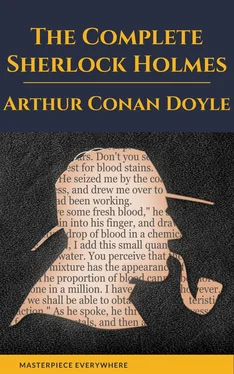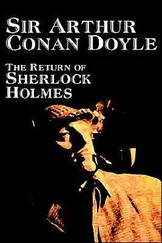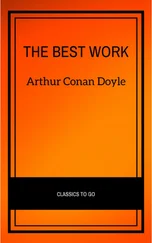"What are they?"
"It appears that his arrest did not take place at once, but after the return to Hatherley Farm. On the inspector of constabulary informing him that he was a prisoner, he remarked that he was not surprised to hear it, and that it was no more than his deserts. This observation of his had the natural effect of removing any traces of doubt which might have remained in the minds of the coroner's jury."
"It was a confession," I ejaculated.
"No, for it was followed by a protestation of innocence."
"Coming on the top of such a damning series of events, it was at least a most suspicious remark."
"On the contrary," said Holmes, "it is the brightest rift which I can at present see in the clouds. However innocent he might be, he could not be such an absolute imbecile as not to see that the circumstances were very black against him. Had he appeared surprised at his own arrest, or feigned indignation at it, I should have looked upon it as highly suspicious, because such surprise or anger would not be natural under the circumstances, and yet might appear to be the best policy to a scheming man. His frank acceptance of the situation marks him as either an innocent man, or else as a man of considerable self-restraint and firmness. As to his remark about his deserts, it was also not unnatural if you consider that he stood beside the dead body of his father, and that there is no doubt that he had that very day so far forgotten his filial duty as to bandy words with him, and even, according to the little girl whose evidence is so important, to raise his hand as if to strike him. The self-reproach and contrition which are displayed in his remark appear to me to be the signs of a healthy mind rather than of a guilty one."
I shook my head. "Many men have been hanged on far slighter evidence," I remarked.
"So they have. And many men have been wrongfully hanged."
"What is the young man's own account of the matter?"
"It is, I am afraid, not very encouraging to his supporters, though there are one or two points in it which are suggestive. You will find it here, and may read it for yourself."
He picked out from his bundle a copy of the local Herefordshire paper, and having turned down the sheet he pointed out the paragraph in which the unfortunate young man had given his own statement of what had occurred. I settled myself down in the corner of the carriage and read it very carefully. It ran in this way:
"Mr. James McCarthy, the only son of the deceased, was then called and gave evidence as follows: 'I had been away from home for three days at Bristol, and had only just returned upon the morning of last Monday, the 3rd. My father was absent from home at the time of my arrival, and I was informed by the maid that he had driven over to Ross with John Cobb, the groom. Shortly after my return I heard the wheels of his trap in the yard, and, looking out of my window, I saw him get out and walk rapidly out of the yard, though I was not aware in which direction he was going. I then took my gun and strolled out in the direction of the Boscombe Pool, with the intention of visiting the rabbit warren which is upon the other side. On my way I saw William Crowder, the game-keeper, as he had stated in his evidence; but he is mistaken in thinking that I was following my father. I had no idea that he was in front of me. When about a hundred yards from the pool I heard a cry of "Cooee!" which was a usual signal between my father and myself. I then hurried forward, and found him standing by the pool. He appeared to be much surprised at seeing me and asked me rather roughly what I was doing there. A conversation ensued which led to high words and almost to blows, for my father was a man of a very violent temper. Seeing that his passion was becoming ungovernable, I left him and returned towards Hatherley Farm. I had not gone more than 150 yards, however, when I heard a hideous outcry behind me, which caused me to run back again. I found my father expiring upon the ground, with his head terribly injured. I dropped my gun and held him in my arms, but he almost instantly expired. I knelt beside him for some minutes, and then made my way to Mr. Turner's lodge-keeper, his house being the nearest, to ask for assistance. I saw no one near my father when I returned, and I have no idea how he came by his injuries. He was not a popular man, being somewhat cold and forbidding in his manners, but he had, as far as I know, no active enemies. I know nothing further of the matter.'
"The Coroner: Did your father make any statement to you before he died?
"Witness: He mumbled a few words, but I could only catch some allusion to a rat.
"The Coroner: What did you understand by that?
"Witness: It conveyed no meaning to me. I thought that he was delirious.
"The Coroner: What was the point upon which you and your father had this final quarrel?
"Witness: I should prefer not to answer.
"The Coroner: I am afraid that I must press it.
"Witness: It is really impossible for me to tell you. I can assure you that it has nothing to do with the sad tragedy which followed.
"The Coroner: That is for the court to decide. I need not point out to you that your refusal to answer will prejudice your case considerably in any future proceedings which may arise.
"Witness: I must still refuse.
"The Coroner: I understand that the cry of 'Cooee' was a common signal between you and your father?
"Witness: It was.
"The Coroner: How was it, then, that he uttered it before he saw you, and before he even knew that you had returned from Bristol?
"Witness (with considerable confusion): I do not know.
"A Juryman: Did you see nothing which aroused your suspicions when you returned on hearing the cry and found your father fatally injured?
"Witness: Nothing definite.
"The Coroner: What do you mean?
"Witness: I was so disturbed and excited as I rushed out into the open, that I could think of nothing except of my father. Yet I have a vague impression that as I ran forward something lay upon the ground to the left of me. It seemed to me to be something grey in colour, a coat of some sort, or a plaid perhaps. When I rose from my father I looked round for it, but it was gone.
"'Do you mean that it disappeared before you went for help?'
"'Yes, it was gone.'
"'You cannot say what it was?'
"'No, I had a feeling something was there.'
"'How far from the body?'
"'A dozen yards or so.'
"'And how far from the edge of the wood?'
"'About the same.'
"'Then if it was removed it was while you were within a dozen yards of it?'
"'Yes, but with my back towards it.'
"This concluded the examination of the witness."
"I see," said I as I glanced down the column, "that the coroner in his concluding remarks was rather severe upon young McCarthy. He calls attention, and with reason, to the discrepancy about his father having signalled to him before seeing him, also to his refusal to give details of his conversation with his father, and his singular account of his father's dying words. They are all, as he remarks, very much against the son."
Holmes laughed softly to himself and stretched himself out upon the cushioned seat. "Both you and the coroner have been at some pains," said he, "to single out the very strongest points in the young man's favour. Don't you see that you alternately give him credit for having too much imagination and too little? Too little, if he could not invent a cause of quarrel which would give him the sympathy of the jury; too much, if he evolved from his own inner consciousness anything so outré as a dying reference to a rat, and the incident of the vanishing cloth. No, sir, I shall approach this case from the point of view that what this young man says is true, and we shall see whither that hypothesis will lead us. And now here is my pocket Petrarch, and not another word shall I say of this case until we are on the scene of action. We lunch at Swindon, and I see that we shall be there in twenty minutes."
Читать дальше












